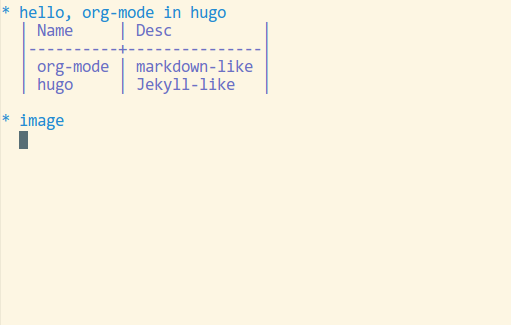try_hugo, file as post
hello, org-mode in hugo #
| Name | Desc |
|---|---|
| org-mode | markdown-like |
| hugo | Jekyll-like |
DONE image #

code #
cpp #
class Solution {
public:
int coinChange(vector<int>& coins, int amount) {
int res = INT_MAX;
sort(coins.begin(), coins.end());
vector<unordered_map<int, int>> record(coins.size());
dfs(record, res, coins, amount, coins.size() - 1, 0);
return res == INT_MAX? -1: res;
}
void dfs(vector<unordered_map<int, int>> &record, int& res,
vector<int>& coins, int target, int idx, int count) {
// cout << "idx:" << idx << " target:" << target
// << " count" << count << endl;
if (idx < 0) return;
if(record[idx].count(target) > 0 and record[idx][target] <= count){
// cout << "cached" << endl;
return;
}
// if(record[idx].count(target) > 0 and record[idx][target] > count){
// cout << "cached, bigger: idx:" << idx
// << " target:" << target
// << " count:" << count
// << " cached count:" << record[idx][target] << endl;
// }
record[idx][target] = count;
if (target % coins[idx] == 0) {
res = min(res, count + target / coins[idx]);
// record[idx][target] = count; // this makes it wrong
return;
}
for (int i = target / coins[idx]; i >= 0; i--) {
if (count + i >= res - 1) break; // pruing
dfs(record, res, coins, target - i * coins[idx], idx - 1, count + i);
}
}
};
python #
import sys
class HostPathMap:
customization = {
}
def __getitem__(self, key):
assert key.isdigit()
return self.customization.get(
key, ["192.168.1.{}".format(key)]
)
name = sys.stdin.read().strip()
host, path = name.split("___")
path = path.replace("__", "/")
expanded_host, working_dir = HostPathMap()[host]
path = working_dir + path
command = """ssh {host} \"mkdir -p $(dirname {path})\";
scp ./{name} {host}:{path}""".format(
name=name, host=expanded_host, path=path
)
sys.stdout.write(command)shell #
#!/usr/bin/env bash
# Usage: callgrind.sh ls -la
set -e
wait_before_valgrind=1
echo "############################################################"
echo " Will run:"
echo " valgrind --tool=callgrind" "$@"
echo " in $wait_before_valgrind second(s)."
echo "############################################################"
sleep $wait_before_valgrind
# use `head` will stop the stdout early. Use `tail` instead
pid=$(valgrind --tool=callgrind "$@" 2>&1 | \
tee /dev/tty | \
tail -n 1 | \
grep -P -o '^==\d+==' | \
grep -P -o '\d+')
wait_before_kcachegrind=2
echo "############################################################"
echo " Valgrind finished. Pid: $pid"
echo " Run \"kcachegrind callgrind.out.$pid\" in $wait_before_kcachegrind second(s)."
echo "############################################################"
sleep $wait_before_kcachegrind
# don't want to see output from kcachegrind, just want the gui.
kcachegrind "callgrind.out.$pid" >/dev/null 2>/dev/nullnew headline #
New text.